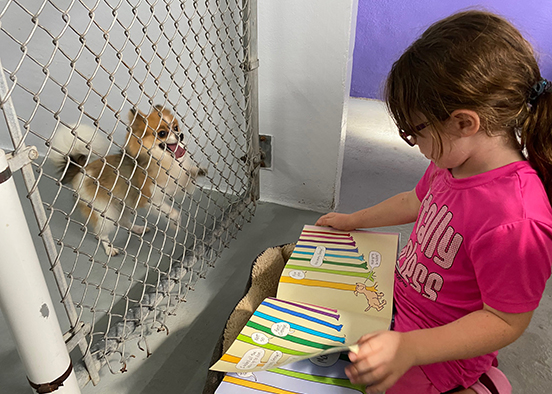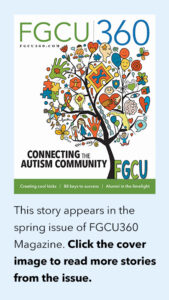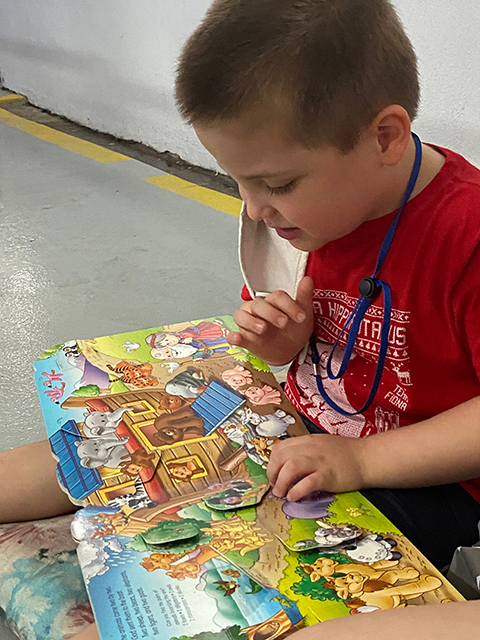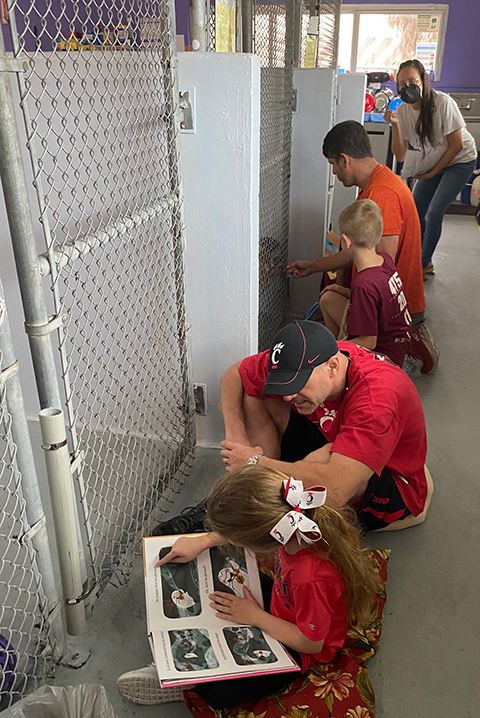Two rows of dog runs stretch the length of a cavernous room with a concrete floor. The occupants comprise an eclectic group.

There’s Kiera, a lumbering, brown and white pit bull mix, her face streaked gray, her beseeching brown eyes clouded with age. Eight brown and black puppies of indiscriminate breed run and tumble over one another, amusing themselves and onlookers. Gizmo, a fluffy Pomeranian, struts proudly around his enclosure like a runway model.
Eager barking breaks out as eight youngsters ranging from pre-school to second grade file in followed by their parents and a gaggle of other adults.
 If they haven’t brought along a book of their own, they can select one from the bookshelf in the Gulf Coast Humane Society’s dog room and then find a four-legged occupant to read to.
If they haven’t brought along a book of their own, they can select one from the bookshelf in the Gulf Coast Humane Society’s dog room and then find a four-legged occupant to read to.
Welcome to the monthly Reading to Dogs hour, when research, among other things, takes place. Here’s what is happening:
- Children, some of whom aren’t avid readers or may not yet know how, sit on the floor near the dog of their choice, turn the pages of books and tell stories.
- Their parents listen without having to take charge of sessions.
- The dogs may not understand the words, but they love that someone has stopped by to talk to them at their eye level. Many sit right next to their gate and listen raptly. Call it doggy enrichment.
- And FGCU researchers observing the activities can gauge the children’s interactions – their reading skills, as well as their emotional and social responses, how attentive and engaged they are.
Other benefits become evident, too.

“It’s definitely a great experience for the kids,” says Kat Brown, an FGCU senior majoring in psychology with a minor in French. An honors student, she serves as a research assistant on the project to Melissa Rodriguez Meehan and Nate Turcotte, FGCU assistant professors of education. “They don’t feel judged when reading, and they also get to interact with animals they might not get to at home. They get to read aloud without judgment and also see other children reading and enjoying it.”
Meehan says the children enjoy selecting their own books to read, something they can’t always do.
“I encourage this freedom,” she says. “They read what they want, how they want, with which dog they want. It helps with motivation. We found that with the participants, they experience an increase in confidence and motivation to read.”
It’s a great way for youngsters to get an early start on community involvement as well.
“A couple of parents pointed out the reason they wanted their kids to come was to instill in them the idea of volunteerism,” Brown said. “I think the program helps the development of their empathy. Even if they come in with some, they see how dogs react to their presence. I heard one kid ask about the donation box as he came in. ‘Why are these dogs here?’ ‘Did they have a family before?’ I feel like that’s a part of the process of developing empathy.”
This project grew from something that began when Meehan was a kindergarten teacher earning her doctoral degree and studying with Professor Tunde Szecsi, program coordinator of the Department of Teacher Preparation Programs in FGCU’s College of Education. Today, Meehan (’10, MPA; ’20, Ed.D.) is a colleague of Szecsi’s and the interim program coordinator while her mentor is on sabbatical.
At first, a small group of children read to the dogs informally. Meehan, who has three dogs of her own – one adopted from Gulf Coast Humane Society – got involved with her own students and some older students from the school. It was one of the older participants who built the bookshelf the readers still use today.
“I asked one little boy who was talking to a dog named Senior why he read to dogs and he said ‘Dogs are great listeners.’ I thought that was beautiful,” Meehan says.

Next came a Facebook page for parents to sign up their children to take part. “The program exists so I thought it was good to use it as a research project,” she says. “We can find out more about the successes, the challenges, get more people aware of it. We can give them feedback on what worked for us and what didn’t. For me it’s a very neat project. It’s kids and dogs – my two favorites.”
What’s not to like?
Gizmo the Pomeranian appears spellbound as Wilhelmina Greer, 6, sits on the floor and reads him a story. Her father, Brian Greer, listens intently, too, holding his cell phone up so her mom, Amanda Tovar, who had to work and couldn’t accompany them, can watch via Facetime as first-grader at Gulf Elementary School in Cape Coral reads Gizmo a story about George the dog.
“It’s great,” says her dad. “She practices reading and the dogs get attention. We all love it.”
The Fleitas family attends the monthly sessions regularly. In fact, they are good friends with Chopper, a pit bull who had been at the shelter for four months. Nico, 5, is in kindergarten at St. Francis Xavier Catholic School in Fort Myers. His 7-year-old brother, Junior, is in second grade there.
“We come ‘cause of the dogs,” Nico says, looking up briefly from his “Wonders of America” book. “We like to read to them.”
Their mother, Angela, agrees.
“Junior doesn’t like reading most of the time but he likes doing it here,” she says. “They have more empathy toward the dogs now, too. And he really likes to read to Chopper.”
Helping to remove the stigma about shelter dogs – that there’s something wrong with them and they wouldn’t make good pets – is yet another plus, Meehan says they have determined through their research. “They see firsthand all kinds of dogs, even pit bulls, are really nice. And it supports an understanding of what shelters do.”
After the hourlong session, humane society volunteers bring Chopper out to the front lawn where they can pet him.
It’s hard to say who is happier as the Fleitas boys pet Chopper’s soft black fur and he snuggles close to them, tail thumping, a doggy smile on his grey muzzle as he lands kisses on their cheeks and ears.
A week later, the Reading with Dogs Facebook page announces that, after 132 days at the Fort Myers shelter, Chopper has a family of his own.
Meehan says that she usually fills two groups on a Saturday and hopes to expand the program to other shelters so that more children and more pets have a chance to experience the joy of reading.
LEARN MORE
Kids of all ages may participate on a space-available basis. Apply to participate through Facebook at Reading with the Dogs SWFL.
